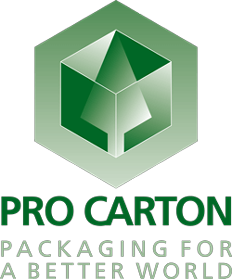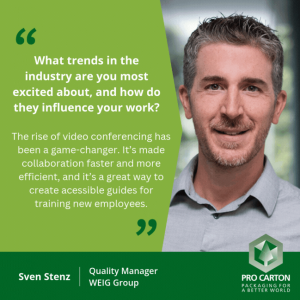Your career journey
Can you describe the key milestones and experiences that have shaped your career in this industry?
I started my journey in 1997 with an internship as an electrician. That was my first exposure to large-scale industrial operations, and I was immediately impressed by the enormous machines and the sophisticated technology that keeps the production process running smoothly. It felt like being a child in a theme park—I was completely inspired to learn more about how everything worked.
From there, I completed an apprenticeship as an energy systems electrician in 1999, and by 2003, I was gaining hands-on experience in different areas of production. I worked in the lab, on the presses, in preparation, drying, and as a machine operator. The company gave me the chance to train in every production position, and I became deeply fascinated by the interconnected processes and cycles that make it all possible.
In 2005, I decided to expand my knowledge with a remote study program in paper technology in Steyrermühl. It was a fantastic time—I graduated with distinction and formed lasting friendships with colleagues from Germany, Austria, and Switzerland. This mix of theory and practice really gave me a strong foundation.
Later, in 2006, I stepped into a role as a shift electrician. One night, I had to cover for a colleague on short notice. That experience was a turning point for me—it taught me how to handle responsibility when you’re the only one on call and how to act quickly and effectively when a system goes down.
One of the most exciting chapters of my career was in 2009 when I worked in Paraguay. I was part of a team responsible for installing and commissioning hydraulic systems, which meant collaborating with colleagues from Austria, Germany, and Paraguay. It was an intense experience that improved my communication skills and taught me a lot about teamwork. Later, I also led training sessions in Spanish to prepare the Paraguayan team to manage operations.
Since then, I’ve taken on various roles, from overseeing quality assurance and technical customer service to improving processes and implementing lean management practices. It’s been rewarding to see the impact of changes we made years ago, knowing they’ve helped create stable, efficient processes that still work today.
Were there any particular challenges or turning points that stand out in your professional journey?
One of the biggest challenges came during my time as a head of department rewinder. Being responsible for troubleshooting and keeping operations running smoothly taught me a lot about thinking on my feet. Another turning point was the opportunity to work abroad—it wasn’t always easy, but collaborating with colleagues from different cultures to achieve a common goal was incredibly rewarding.
Daily work and responsibilities
What does a typical day or week in your current role look like?
My day usually starts with a meeting at 7:30 am. By then, I’ve already reviewed the key production parameters and identified any factors that might have caused fluctuations or defects. Afterward, I have a feedback session with plant management to reinforce the importance of product quality.
External communication is also a big part of my role. Most of it happens via email, but for urgent issues, we use Teams meetings. Visiting customers on-site is one of the most valuable parts of my job—it helps me understand the challenges they face when processing our products and gives me the chance to work directly with them to optimise our solutions. It’s also a great way to gauge the mood in the market.
I’m also involved in technical meetings, where I analyse statistics and discuss trends with customer groups. These discussions provide valuable insights into where the industry is heading and how we can adapt.
Are there any specific projects or initiatives you’ve been involved in recently that you find particularly exciting or innovative?
One initiative I’m especially proud of is the implementation of a problem-solving process using Ishikawa diagrams during my time as the head of department rewinder. It’s an excellent tool for understanding complex issues, identifying root causes, and creating actionable plans. It also ensures that we document solutions for future reference, which is incredibly useful for continuous improvement.
Industry impact
How do you believe your work contributes to the sustainable and environmentally friendly aspects of cartonboard packaging?
From my perspective, sustainability is about making every effort to reduce waste and improve efficiency. Doing things right the first time. For example, by lowering our complaint rate, we minimise the need for re-production, which saves energy and resources. It also helps us avoid returns, stabilises production processes, and ultimately conserves raw materials.
On a personal level, I find it exciting to contribute to something bigger. The materials we produce are used in innovative ways, like gypsum boards for housing, which I’ve come to appreciate even more while renovating my own home.
What trends or developments in the industry are you most excited about, and how do they influence your work?
The rise of video conferencing has been a game-changer. It’s made collaboration faster and more efficient, and it’s a great way to create screencasts that serve as long-term “how-to” guides for training new employees. It also helps us archive knowledge for future generations. This shift has made our work more adaptable and improved our ability to share expertise.
Advice and inspiration
What advice do you have for individuals considering a career in the carton and cartonboard industry?
This industry offers a wide range of opportunities, and you can discover your strengths and interests along the way. Finding a mentor who’s been down a similar path can be incredibly helpful—they can offer guidance and open doors you might not have considered.
Are there any personal or professional accomplishments that you are especially proud of and would like to share?
One of my proudest moments was working abroad with a diverse team of colleagues from different nationalities. Achieving the shared goal of commissioning a production facility was both challenging and immensely rewarding.
What is the one reason why you are proud to work in the carton and cartonboard industry?
It’s the ability to make a significant impact with even the smallest adjustments. Knowing that my work contributes to sustainable practices and meaningful solutions makes me proud to be part of this industry.




